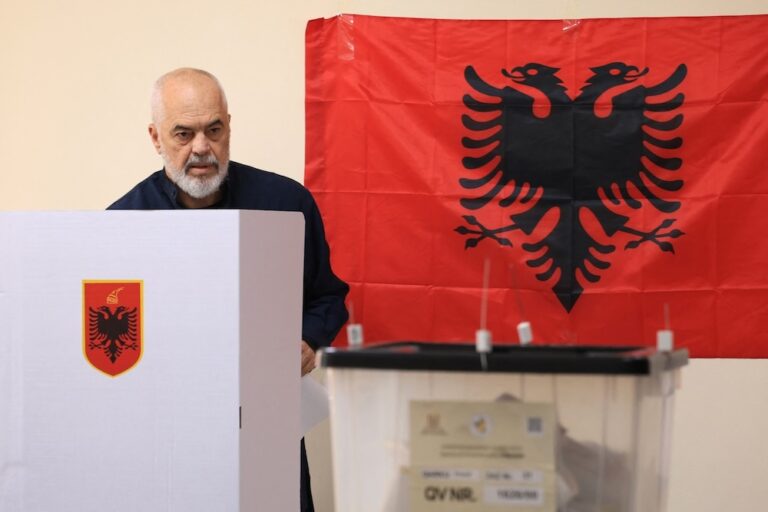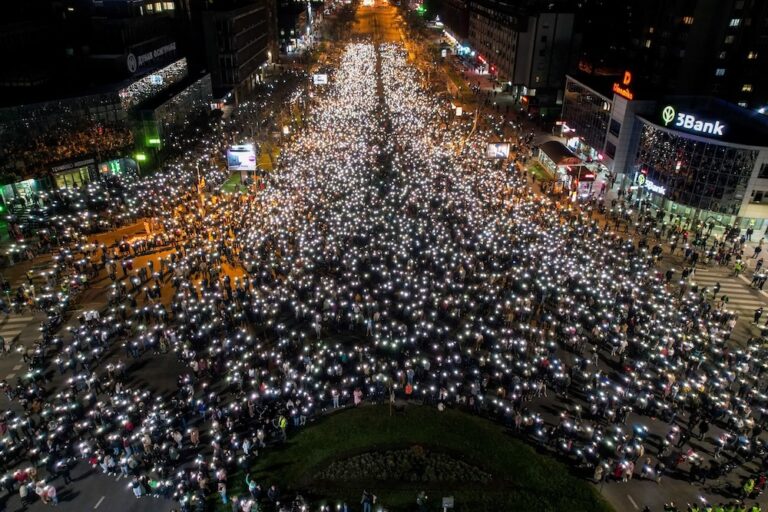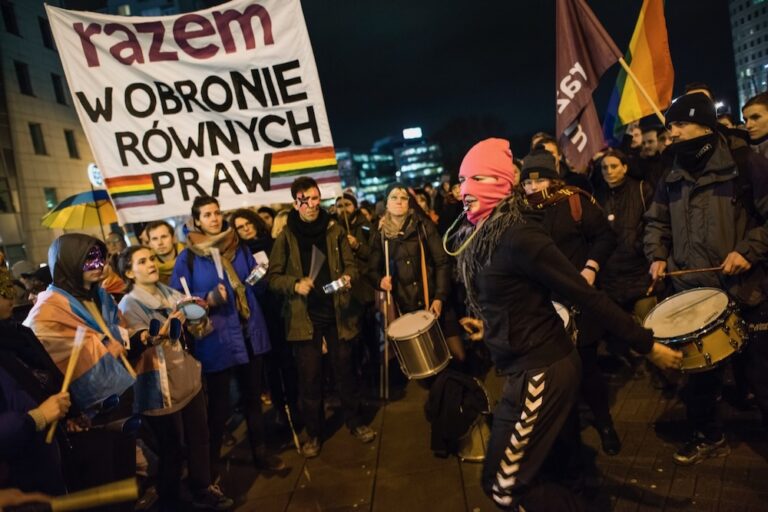April 2022 in Europe and Central Asia: A free expression round up produced by IFEX's Regional Editor Cathal Sheerin, based on IFEX member reports and news from the region.
An EU anti-SLAPP directive; Russia continues to target media and civil society organisations in Ukraine and at home; Belarusian Association of Journalists awarded 2022 UNESCO/Guillermo Cano World Press Freedom Prize; Turkey jails Osman Kavala for life and targets women’s anti-femicide organisation; a #FreeAssange petition.
“Daphne’s law”
The final week of April saw very welcome news for journalists and civil society organisations that investigate corruption when the European Commission published its Proposal for a Directive on strategic lawsuits against public participation (SLAPP).
These abusive lawsuits, deployed by the rich and powerful across the EU to silence their critics, deter investigative reporting by dragging journalists and other public watchdogs into long and costly legal proceedings. Daphne Caruana Galizia, the murdered Maltese journalist, was facing over 40 of these lawsuits at the time of her death.
The proposed Directive, which focuses on cross-border cases, includes an early dismissal mechanism, a regime of sanctions, and protective measures for those targeted by SLAPPs. The proposal was warmly welcomed by IFEX members, and especially by the partners of the CASE Coalition, whose work fed into the initiative. The proposed Directive will now have to be negotiated and adopted by the European Parliament and the Council before it can become EU law.
“It felt like death was everywhere”
Further evidence emerged in April that Russia is committing war crimes in Ukraine. Human Rights Watch’s investigation into the events that took place during the Russian occupation of Bucha (near Kyiv), has found “extensive evidence” of summary executions and other unlawful killings, enforced disappearances, and torture. The details of the report are shocking: according to HRW’s researcher Richard Weir, “Nearly every corner in Bucha is now a crime scene, and it felt like death was everywhere”.
As part of its war effort, Russia continues to target independent media and civil society, both in Ukraine and at home.
Towards the end of the month, IFEX’s Ukrainian member, the Institute of Mass Information (IMI), published an overview of the 243 attacks on media in Ukraine that were carried out by Russian forces in the first two months of the war. According to IMI, by 24 April, seven journalists had been killed while reporting on the conflict (and several more had been killed while not reporting), nine had been injured, and at least 15 were missing. IMI also recorded eight abductions of journalists by Russian forces and the closure of 106 media outlets due to the invasion.
On 28 April, Russian shelling of Kyiv during a UN visit to the capital claimed the life of another journalist, Radio Free Europe Radio Liberty producer Vira Hyrych.
In Russia, the authorities continue to stifle opinion that dissents from the Kremlin line on the war. The European Federation of Journalists (EFJ) lists six Russian journalists who have been detained, fined or prosecuted because their views of the conflict in Ukraine are not those promoted by the Kremlin; several more journalists have been added to the list of so-called ‘foreign agents’.
And while independent journalists are being persecuted, sometimes violently (as in the case of Nobel Prize winner Dmitry Muratov), pro-Kremlin disinformation and propaganda have reached bizarre and often sadistic levels. April saw state TV air gleeful discussions about nuclear strikes on the US, proposals that Ukrainian prisoners be displayed in public for abuse, and RT’s editor-in-chief apparently reconciling herself to a nuclear Third World War because “We will go to heaven and they will simply croak.”
April also saw the Russian authorities inflict another blow on civil society by shutting down the offices of 15 international human rights organisations in Russia, including those of Human Rights Watch and Amnesty International.
IFEX members continue to provide support to journalists working in Ukraine and those who have fled the war (see March’s brief for full details). This month, EFJ – in collaboration with other journalists’ organisations – launched three new support centres in Lviv, Ivano-Frankivsk and Chernivtsi. These centres offer journalists a work space, training, safety equipment and relocation assistance where necessary. Early in the month, IFEX and IFEX members signed the Perugia Declaration for Ukraine, which calls for increased support for independent media in Ukraine and for the safety and security of all journalists reporting there to be prioritised.
Since it launched its invasion of Ukraine, Russia has faced a raft of sanctions. There were further repercussions in April when Russia was suspended from the UN Human Rights Council and voted out of the UN Economic and Social Council.
“Acting against the law and morality”
Civic space continues to face huge pressure in Turkey.
On 25 April, following a dubious trial in which conspiracy theories took the place of evidence, civil society leader Osman Kavala was handed an aggravated life sentence and seven of his co-defendants were sentenced to 18 years each in prison: all were convicted of “attempting to overthrow the government”.
Kavala has already spent four-and-a-half years behind bars on trumped-up charges. In 2019, the European Court of Human Rights ruled that Turkey should release him. This call went unheeded – as did the same call made by the Committee of Ministers of the Council of Europe – resulting in the Committee voting in February 2022 to begin infringement proceedings against Turkey.
While the sentencing was widely condemned by the international community, President Erdoğan adopted the language of other authoritarians and populists in the region by dismissing Kavala as the “George Soros of Turkey”.
Women’s civil society organisations – always so prominent in the battle to protect rights in Turkey – have been in the spotlight since Turkey withdrew from the Istanbul Convention on violence against women in 2021. Following that withdrawal, the country saw an increase in misogynistic violence.
In April, the Istanbul Public Prosecutor’s Office filed a lawsuit against the women’s rights group We Will Stop Femicide (WWSF), which it accused of “acting against the law and morality”. The lawsuit comes after several complaints about the organisation, including accusations that it has “disintegrated the family structure by ignoring the concept of family”. The Prosecutor’s Office is seeking WWSF’s closure. WWSF has frequently criticised the government for its poor record on dealing with violence against women and has called on Turkey to reinstate the Istanbul Convention. Founded in 2010 in response to the murder of a teenage student by her partner, the organisation provides legal support to victims of domestic violence, collects data on femicide, monitors trials and organises rallies.
April also saw 40 women indicted on charges of “attending an illegal demonstration” and “not dispersing despite a warning”. These women were detained on International Women’s Day while attempting to take part in the banned Feminist Night March. Several of those detained suffered violence at the hands of the police.
1,168 political prisoners
On 20 April in Belarus, police – dressed in riot gear and wielding sledgehammers – raided the home of Novy Chas editor-in-chief Aksana Kolb. According to the Belarusian Association of Journalists, Kolb told relatives that she would be detained for ten days; she has reportedly been charged with “organisation and preparation of actions that grossly violate public order or active participation in them”.
This is not the first time that Kolb has been targeted by the authorities, who previously raided her home in October 2021, interrogated her, and forced her to sign a non-disclosure agreement before releasing her. The independent Novy Chas ceased publishing in August 2021 and Kolb is one of 26 members of the press who are currently behind bars.
Another of those 26 prisoners is Belsat journalist Katsiaryna Andreyeva, who, according to statements made by her husband in April, has been charged with treason. She faces seven to 15 years in prison if convicted and her trial could take place in May. Andreyeva was detained whilst covering an anti-Lukashenka protest in November 2020 and has been behind bars ever since.
April saw the 26th anniversary of the renowned Belarusian rights organisation Viasna, seven of whose members – including founder Ales Bialiatski – are currently in prison. Two members – Marfa Rabkova and Andrey Chapiuk – were put on trial behind closed doors this month and face potential prison sentences of 20 years and eight years respectively if convicted on politically-motivated charges. According to Viasna, by 29 April there were 1,168 political prisoners in Belarus.
The Belarusian authorities also targeted Human Rights Watch this month, blocking access to its website just days after the organisation published a report on Russia’s war crimes in Ukraine.
Welcome news!
April ended on a high note, when IFEX member the Belarusian Association of Journalists (BAJ) was awarded the 2022 UNESCO/Guillermo Cano World Press Freedom Prize. BAJ has been one of the leading free expression organisations in Belarus for decades, and has continued its vital work despite intense persecution, including a Supreme Court dissolution order in August 2021.
In brief
The Council of Europe Platform to Promote the Protection of Journalism and the Safety of Journalists, together with partner organisations, launched its 2021 Annual Report in April. Entitled “Defending Press Freedom in Times of Tension and Conflict”, the report registers a 41% increase in press freedom alerts recorded in 2021 compared with 2020, and a 60% increase in physical attacks on journalists. See the full report for more details.
Cartoonists Rights Network International and the Freedom Cartoonists Foundation have established a new international cartoonists’ award – the Kofi Annan Courage in Cartooning Award – which will be launched on World Press Freedom Day. The award will alternate biannually with Cartoonists Rights Network International’s prize the Robert Russell Courage in Cartooning Award.
Nineteen free expression organisations have written to the UK Home Secretary, urging her to reject the extradition to the US of the Wikileaks founder Julian Assange. Reporters Without Borders has also launched a #FreeAssange petition, with the same call. The petition currently has over 31,000 signatures and will be available to sign until 18 May.
Civil society organisations joined IFEX’s Kyrgyz members, Media Policy Institute and Public Association “Journalists”, in calling on the Kyrgyz government to end the increasing harassment of independent press in Kyrgyzstan.



